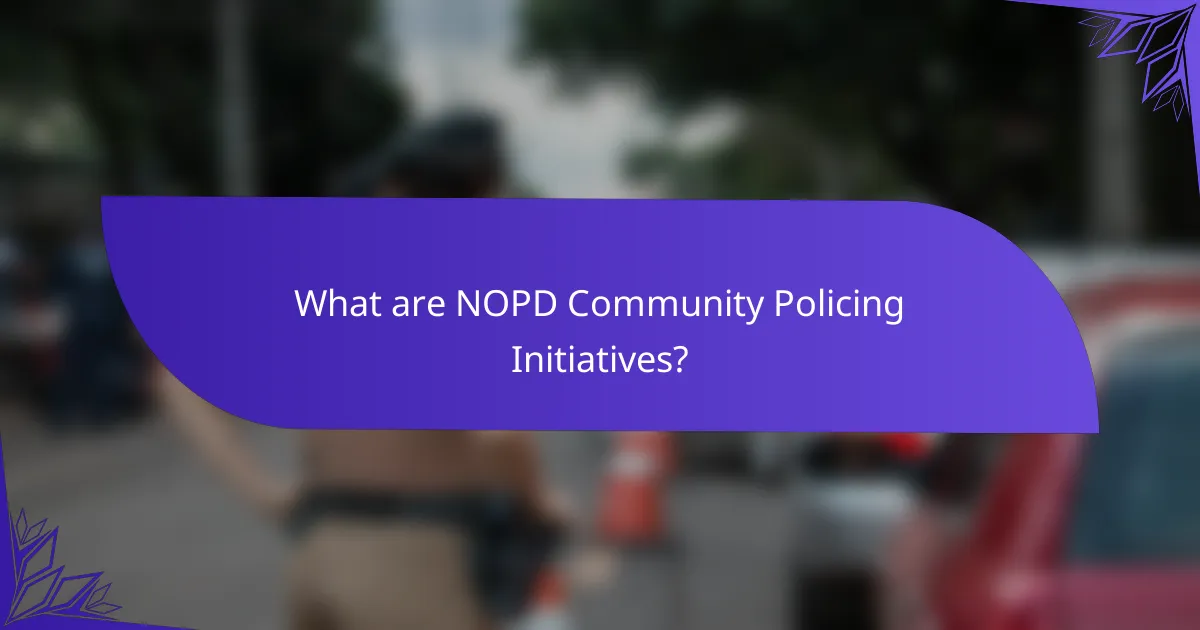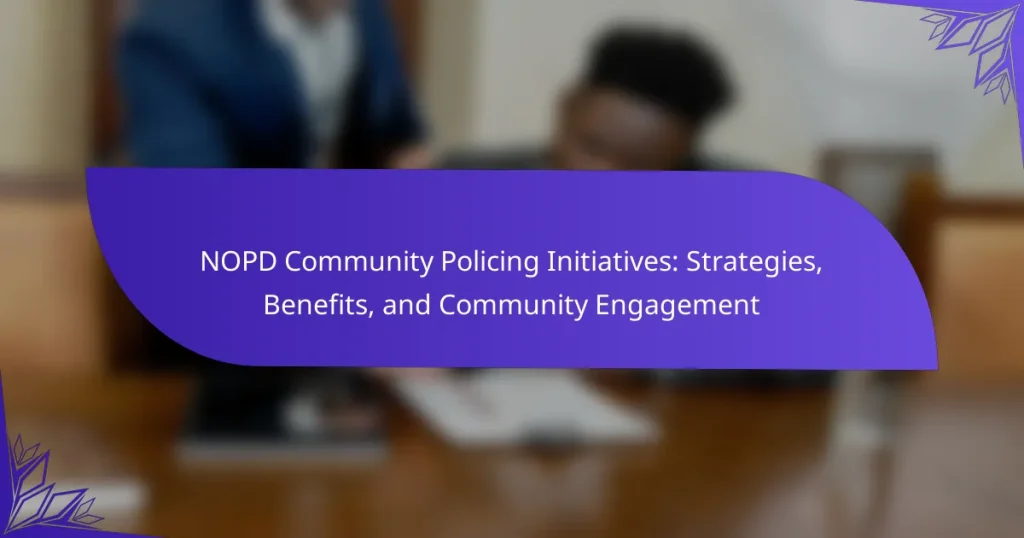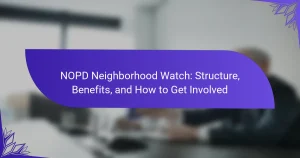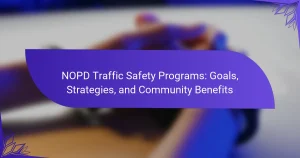
What are NOPD Community Policing Initiatives?
NOPD Community Policing Initiatives are programs aimed at fostering collaboration between the New Orleans Police Department and the community. These initiatives focus on building trust and improving public safety through proactive engagement. The NOPD implements strategies such as neighborhood watch programs, community meetings, and outreach events. These efforts encourage residents to participate in crime prevention and problem-solving. Statistics show that community policing can lead to a reduction in crime rates and increased community satisfaction. By involving citizens, NOPD aims to create a safer environment while enhancing the relationship between police and the community.
How do NOPD Community Policing Initiatives function?
NOPD Community Policing Initiatives function by fostering partnerships between the police and the community. These initiatives aim to enhance public safety through collaboration. Officers engage with residents to identify local issues and develop tailored solutions. Regular community meetings allow for open dialogue and feedback. Programs focus on crime prevention and community education. The NOPD allocates resources based on community needs and concerns. This approach has led to increased trust and cooperation between citizens and law enforcement. Studies show that community policing reduces crime rates and improves neighborhood satisfaction.
What are the key components of NOPD Community Policing Initiatives?
Key components of NOPD Community Policing Initiatives include community engagement, problem-solving partnerships, and proactive crime prevention. Community engagement fosters relationships between police and residents. This approach encourages open communication and trust-building. Problem-solving partnerships involve collaboration with community stakeholders to address local issues. Proactive crime prevention focuses on identifying and mitigating potential crime before it occurs. These components aim to enhance public safety and improve community relations. The NOPD emphasizes these strategies to create a safer environment for all citizens.
How do these components interact within the community?
The components of NOPD community policing initiatives interact within the community through collaboration, communication, and shared responsibility. Officers engage with residents to build trust and gather insights. This interaction fosters a sense of safety and encourages community members to report crimes. Community meetings and events facilitate open dialogue between law enforcement and citizens. These initiatives also involve local organizations, enhancing resource sharing and support. Research shows that effective community policing reduces crime rates and improves public perception of law enforcement. For example, a study by the Bureau of Justice Assistance highlighted successful community engagement strategies in various cities, demonstrating their positive impact on community safety.
What strategies are employed in NOPD Community Policing Initiatives?
NOPD Community Policing Initiatives employ strategies like building community partnerships, enhancing visibility, and fostering communication. These strategies aim to improve relationships between police and community members. Building partnerships involves collaborating with local organizations and residents to address community concerns. Enhancing visibility includes increasing police presence in neighborhoods to deter crime and promote safety. Fostering communication encourages open dialogue between officers and citizens, allowing for feedback and trust-building. These strategies are designed to create a proactive approach to policing, focusing on prevention rather than reaction.
What types of strategies are most effective in community engagement?
Effective strategies in community engagement include building trust, fostering collaboration, and utilizing technology. Building trust involves consistent communication and transparency from law enforcement. According to a study by the International Association of Chiefs of Police, trust is essential for effective community policing. Fostering collaboration means involving community members in decision-making processes. Research shows that participatory approaches lead to increased community satisfaction. Utilizing technology such as social media enhances communication and allows for real-time feedback. A report from the Pew Research Center highlights that 69% of adults engage with local news via social media. These strategies collectively enhance community relationships and improve overall safety.
How are these strategies adapted to meet community needs?
NOPD community policing strategies are adapted to meet community needs through active engagement and collaboration. The NOPD conducts surveys and community meetings to identify specific local concerns. Officers build relationships with residents to foster trust and open communication. Tailored programs address unique issues such as crime prevention and youth engagement. The NOPD also partners with local organizations for resource sharing. Data-driven approaches help prioritize areas needing attention. These adaptations ensure policing efforts align with community expectations and enhance public safety.
What benefits do NOPD Community Policing Initiatives provide?
NOPD Community Policing Initiatives provide enhanced community trust and collaboration. These initiatives foster positive relationships between police officers and community members. They encourage open communication about safety concerns. This approach leads to more effective crime prevention strategies. Additionally, community policing promotes shared responsibility for public safety. It often results in reduced crime rates in engaged neighborhoods. Research indicates that areas with active community policing see increased reporting of crimes. This reporting helps law enforcement respond more efficiently.
How do these initiatives improve community safety?
Community policing initiatives improve community safety by fostering trust between law enforcement and residents. This collaboration leads to increased reporting of crimes. When residents feel safe to communicate with police, they provide valuable information. Enhanced communication allows for timely responses to incidents. These initiatives also promote crime prevention strategies tailored to community needs. For example, neighborhood watch programs empower residents to monitor their surroundings. Studies show areas with active community policing have lower crime rates. The NOPD has reported a decrease in violent crime in neighborhoods engaged in these initiatives. Overall, community policing creates a safer environment through proactive engagement and collaboration.
What impact do they have on community trust in law enforcement?
Community policing initiatives significantly enhance trust between law enforcement and the community. These strategies foster open communication and collaboration. When officers engage with residents, they build relationships based on mutual respect. Studies show that community policing can reduce crime rates and increase public satisfaction. For instance, a report by the Bureau of Justice Assistance highlights improved perceptions of safety in neighborhoods with active community policing. Trust increases when communities feel their concerns are heard and addressed by law enforcement. Ultimately, effective community policing leads to a more cooperative environment for crime prevention and public safety.
How does community engagement play a role in NOPD initiatives?
Community engagement is vital to NOPD initiatives. It fosters trust between police and residents. Engaged communities are more likely to report crimes and collaborate on safety measures. NOPD utilizes community meetings to gather input and address concerns. These interactions help shape policing strategies tailored to specific neighborhoods. Research indicates that community involvement reduces crime rates and enhances public safety. Studies show that areas with active community engagement experience lower levels of fear and increased satisfaction with police services.
What methods are used to foster community engagement?
Community engagement is fostered through various methods in policing initiatives. These methods include community meetings and forums. They provide a platform for dialogue between police and community members. Additionally, neighborhood watch programs encourage residents to collaborate with law enforcement. Outreach events, such as safety fairs, increase visibility and trust. Social media campaigns inform and engage the community effectively. Partnerships with local organizations enhance resource sharing and support. Surveys and feedback mechanisms allow residents to voice concerns and suggestions. These strategies have been shown to improve public safety and community relations.
How do community members contribute to the success of these initiatives?
Community members contribute to the success of NOPD community policing initiatives by actively participating in programs and providing feedback. Their involvement fosters trust between law enforcement and the community. Community members often share valuable insights about local issues. This information helps police tailor their strategies effectively. Participation in neighborhood watch programs enhances public safety. Engaging in community meetings allows residents to voice concerns and suggestions. Their collaboration leads to increased transparency and accountability in policing. Research indicates that communities with active engagement see a reduction in crime rates.
What challenges do NOPD Community Policing Initiatives face?
NOPD Community Policing Initiatives face several challenges. One major challenge is community distrust towards law enforcement. Historical tensions in New Orleans contribute to this skepticism. Another challenge is the lack of adequate funding for programs. Limited resources hinder the effectiveness of community engagement efforts. Additionally, staffing shortages affect the implementation of initiatives. Officers may be overburdened with other duties, reducing their availability for community policing. Finally, varying community needs complicate the development of effective strategies. Tailoring initiatives to diverse neighborhoods requires significant effort and understanding.
How can these challenges be addressed effectively?
Challenges in NOPD community policing can be addressed effectively through enhanced training, community involvement, and data-driven strategies. Training officers in cultural competency improves interactions with diverse communities. Engaging community members in decision-making fosters trust and cooperation. Implementing data analytics helps identify crime patterns and allocate resources efficiently. Regular feedback from the community can guide policing strategies and improve service delivery. Research shows that departments with strong community ties see reductions in crime rates. For example, a study by the Police Executive Research Forum found that community engagement leads to more effective policing outcomes.
What lessons have been learned from past initiatives?
Past initiatives in community policing have highlighted the importance of building trust between law enforcement and communities. Successful engagement requires consistent communication and transparency. Training officers in cultural competency has proven essential for effective interactions. Community involvement in decision-making fosters a sense of ownership and accountability. Data-driven approaches have shown that tailored strategies can address specific community needs. Evaluating outcomes and adapting strategies based on feedback is crucial for long-term success. Collaborative partnerships with local organizations enhance resource sharing and support. Overall, these lessons emphasize the need for a holistic approach to community policing.
What are best practices for implementing NOPD Community Policing Initiatives?
Establishing strong relationships with community members is a best practice for implementing NOPD Community Policing Initiatives. This involves regular engagement and open communication with residents. Officers should participate in community events to build trust. Training officers in cultural competency is essential. This ensures they understand and respect the diverse backgrounds of community members. Collaborative problem-solving with residents helps identify local issues. Utilizing crime data to inform strategies improves effectiveness. Regular feedback from the community can guide ongoing efforts. These practices have been shown to enhance public safety and community satisfaction.
How can other communities replicate successful strategies?
Other communities can replicate successful strategies by studying and adapting the NOPD’s community policing initiatives. They should analyze the specific methods used, such as building partnerships with local organizations. Implementation of regular community meetings can foster open communication and trust. Training law enforcement on cultural competency enhances interactions with diverse populations. Data-driven approaches can help identify crime trends and allocate resources effectively. Establishing feedback mechanisms allows communities to voice concerns and suggest improvements. Research shows that community involvement leads to better policing outcomes, as seen in the NOPD’s reduction of crime rates through collaborative efforts.
What resources are available for communities looking to enhance policing initiatives?
Communities looking to enhance policing initiatives can access several resources. These include grant programs, community policing training, and partnerships with local organizations. The Bureau of Justice Assistance offers funding opportunities specifically for community policing projects. Additionally, the Community Oriented Policing Services (COPS) program provides training and technical assistance. Local law enforcement agencies often collaborate with community groups to develop tailored strategies. Research studies, such as those from the Police Executive Research Forum, provide evidence-based practices for effective policing. Resources from national organizations, like the International Association of Chiefs of Police, also support community engagement efforts.
NOPD Community Policing Initiatives are programs designed to enhance collaboration between the New Orleans Police Department and local communities, focusing on building trust and improving public safety. The article outlines the functioning of these initiatives, highlighting key components such as community engagement, problem-solving partnerships, and proactive crime prevention strategies. It discusses the benefits these initiatives provide, including increased community trust, reduced crime rates, and improved public safety perceptions. Additionally, the challenges faced by NOPD in implementing these initiatives and best practices for successful community engagement are examined, along with resources available for communities to enhance their policing efforts.




